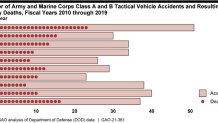The U.S. Marine who was killed when an Amphibious Combat Vehicle (ACV) crashed at Marine Corps Base Camp Pendleton Tuesday night has been identified by Marine Corps officials.
Sgt. Matthew K. Bylski, of Michigan, was one of 15 servicemembers on board the tactical vehicle that rolled over amid "a ground movement during training" around 6 p.m. Tuesday, the USMC said.
Bylski was trained as an ACV crewman assigned to Battalion Landing Team 1/5, 15th Marine Expeditionary Unit, serving as a vehicle commander.
"Words fail to express our sorrow at the tragic loss of Sgt. Bylski; an outstanding Marine and a leader within his platoon," said Col. Sean Dynan, commanding officer of the 15th MEU. "The MEU – the Marines who lived, trained, and learned from Sgt. Bylski, mourn alongside his family and friends. The entire 15th MEU ‘Vanguard’ family is affected by his absence.”
Get San Diego local news, weather forecasts, sports and lifestyle stories to your inbox. Sign up for NBC San Diego newsletters.
The 14 others were transported to various hospitals, including Naval Hospital Camp Pendleton, the USMC said. As of Thursday, only one Marine remains at the hospital in good condition as the others were treated and released.
The identities of all others involved were also withheld.
The USMC said the incident was under investigation but did not elaborate further.
Local
The ACV's have been involved in several training accidents and problems since their rollout in 2020.
Between 2010 and 2019, Army and Marine tank and truck accidents killed more than 120 military members outside of combat, according to a 2021 Government Accountability Office report. During that same period, rollovers were associated with almost a quarter of all reported tactical vehicle accidents, more than 40% of serious injury wrecks, and 63% of accidents involving a military death.

In 2021, a pause was ordered on their amphibious use due to problems with the vehicle's towing mechanism. Then, mishaps with two vehicles in July 2022 led Lt. Gen David Furness to pause all, "waterborne ACV operations" for an investigation. The halt was lifted for all of 22 days before being reinstated following another mishap.
The pause ordered by Furness only included waterborne training, therefore allowing ACVs to continue training on land.
The ACVs were introduced to replace the decades-old Amphibious Assault Vehicle (AAV). The move came months after nine servicemembers died when their Amphibious Assault Vehicle sank during training.



